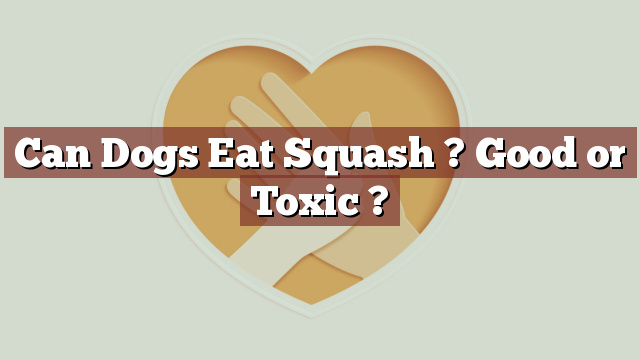Can Dogs Eat Squash? Good or Toxic?
Knowing which foods are safe for our canine companions is essential for their overall health and well-being. While some human foods can be enjoyed by dogs, others can be potentially harmful or even toxic to them. In this article, we will explore whether dogs can safely consume squash, its nutritional value, potential risks, and benefits, as well as what to do if your dog eats squash.
Nutritional Value of Squash: Vitamins, Minerals, and Fiber
Squash is a nutritious vegetable that offers a variety of vitamins, minerals, and fiber. It is rich in vitamins A, C, and E, which play important roles in promoting a healthy immune system, maintaining healthy skin and coat, and supporting overall eye health. Additionally, squash contains potassium, which is crucial for proper muscle and nerve function, and manganese, which aids in bone health and metabolism.
Furthermore, squash is a great source of dietary fiber. Fiber promotes healthy digestion and can help alleviate constipation in dogs. It also aids in weight management and can contribute to a feeling of fullness, which may be beneficial for dogs on a weight loss program.
Is Squash Safe for Dogs? Potential Toxicity and Risks
Yes, dogs can safely eat squash. In fact, squash is often recommended as a healthy addition to a dog’s diet. However, it is important to note that not all parts of the squash are safe for dogs to consume. The flesh of the squash is generally safe, but the seeds and skin can pose potential risks.
The seeds of certain squash varieties, such as pumpkins, can cause digestive upset in dogs, especially if consumed in large quantities. They may also present a choking hazard or cause an intestinal blockage. Therefore, it is best to remove the seeds before feeding squash to your dog.
Moreover, some dogs may have difficulty digesting the skin of certain squash varieties, which can lead to gastrointestinal discomfort. If you choose to feed your dog squash, it is recommended to peel it before serving.
Potential Risks and Benefits of Dogs Eating Squash
Feeding squash to your dog in moderation can provide several benefits. As mentioned earlier, the fiber content in squash promotes healthy digestion and can help regulate bowel movements. This is particularly beneficial for dogs with sensitive stomachs or those prone to constipation.
Furthermore, the vitamins and minerals found in squash contribute to overall canine health. Vitamin A supports vision, vitamin C boosts the immune system, and vitamin E helps maintain healthy skin and coat. Potassium and manganese are essential for various bodily functions, including muscle and nerve function, as well as bone health.
However, it is important to keep in mind that too much squash can cause digestive upset in dogs. Introduce squash gradually into your dog’s diet and observe their response to ensure they tolerate it well.
What to Do If Your Dog Eats Squash: Signs, Symptoms, and Treatment
If your dog accidentally consumes squash, it is unlikely to cause significant harm. However, keep an eye out for any signs of discomfort or digestive upset, such as vomiting, diarrhea, or loss of appetite. If these symptoms persist or worsen, it is recommended to contact your veterinarian for further guidance.
In cases where your dog has consumed a large amount of squash seeds or skin, or if you notice any signs of distress such as choking or difficulty breathing, seek immediate veterinary assistance.
Conclusion: Moderation and Proper Preparation Key for Dogs and Squash
In conclusion, dogs can safely eat squash as long as it is properly prepared and fed in moderation. Squash offers valuable nutritional benefits, including vitamins, minerals, and fiber that support a dog’s overall health. However, it is crucial to remove any seeds and peel the squash before serving it to your furry friend.
As with any new food, it is important to introduce squash gradually and monitor your dog’s reaction. If you have any concerns or your dog experiences any adverse effects after consuming squash, consult your veterinarian for guidance. By following these guidelines, you can safely incorporate squash into your dog’s diet and provide them with a healthy and varied nutrition.
Thank you for investing your time in exploring [page_title] on Can-Eat.org. Our goal is to provide readers like you with thorough and reliable information about various dietary topics. Each article, including [page_title], stems from diligent research and a passion for understanding the nuances of our food choices. We believe that knowledge is a vital step towards making informed and healthy decisions. However, while "[page_title]" sheds light on its specific topic, it's crucial to remember that everyone's body reacts differently to foods and dietary changes. What might be beneficial for one person could have different effects on another. Before you consider integrating suggestions or insights from "[page_title]" into your diet, it's always wise to consult with a nutritionist or healthcare professional. Their specialized knowledge ensures that you're making choices best suited to your individual health needs. As you navigate [page_title], be mindful of potential allergies, intolerances, or unique dietary requirements you may have. No singular article can capture the vast diversity of human health, and individualized guidance is invaluable. The content provided in [page_title] serves as a general guide. It is not, by any means, a substitute for personalized medical or nutritional advice. Your health should always be the top priority, and professional guidance is the best path forward. In your journey towards a balanced and nutritious lifestyle, we hope that [page_title] serves as a helpful stepping stone. Remember, informed decisions lead to healthier outcomes. Thank you for trusting Can-Eat.org. Continue exploring, learning, and prioritizing your health. Cheers to a well-informed and healthier future!

